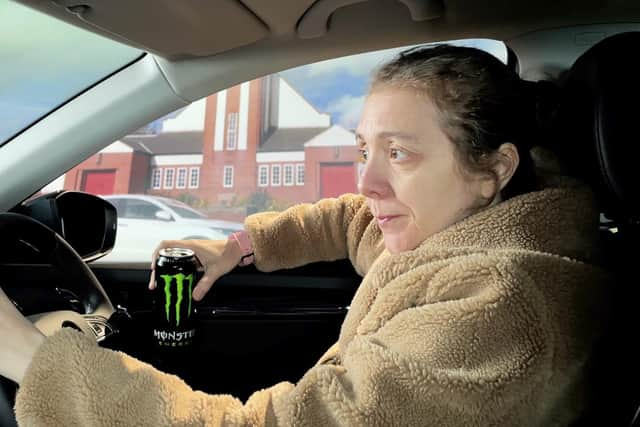Theatre reviews: Tennis Elbow | Distance Remaining


Tennis Elbow ****
Distance Remaining ****
To be old enough to remember the first stage production of Writer’s Cramp – the theatrical debut of artist, playwright and all-round genius John Byrne – is to be, well, pretty old. Yet still, that sweaty evening in the Calton Studios, during the Edinburgh Fringe of 1977, remains as fresh as a Nitshill daisy in the mind, both for terrific performances from a dazzling cast (Bill Paterson, Alex Norton, John Bett), and, of course, for the sheer, blistering brilliance of the linguistic and socio-cultural games Byrne played with the cultural state of post-Second World War Scotland and Britain.


Nursed into existence by the late, great Marilyn Imrie for BBC radio drama, Writer’s Cramp told the story of one Francis Seneca McDade, a latterday McGonagall whose humble origins in Paisley’s Back Sneddon Street, and frequently straitened circumstances, in no way match his soaring ambition to scale the heights of Britain’s literary establishment, and to embrace the linguistic style of the ruling classes, as described in many a boys’ adventure comic.
Advertisement
Hide AdAnd now, 44 years on, Byrne’s astonishing satirical vision of postwar creative struggle receives a remarkable new lease of life – or at least an energising boot up the backside – courtesy of Tennis Elbow, part of the Pitlochry / Lyceum Sound Stage season of audio drama, which not only takes Byrne’s story back to its radio roots, but also adds an entirely new twist by placing centre stage not Francis McDade, but his long-suffering wife Pamela Crighton-Cavers, a woman of strong Sapphic tendencies, and creative ambitions at least as high as her husband’s.
The result – directed by Pitlochry’s Elizabeth Newman with the kind of sure touch and tender loving care that suggests real love for Byrne and his gifts – is a hugely enjoyable romp through Byrne’s world of rich rococo detail and ludicrous incongruities, with young gels in Oxford colleges desperately seeking publication from minor imprints in Giffnock, whole scenes in which every word – pace Johners and Aggers of Test Match Special – ends in that same posh suffix, and every gung-ho phrase pressed into service in an increasingly desperate search for cash income of any sort.
Just occasionally, Byrne’s love of accumulated detail can sound a shade laboured; and his obsession with certain place-names in the hinterlands of Glasgow may baffle the uninitiated, although not in a bad way. As ever, though, actors who tackle his writing with the kind of operatic athleticism it requires can make it sparkle like a whole bucket of diamonds; and Newman’s terrific company – led by the wonderful Kirsty Stuart as Pamela, and Maureen Beattie as her headmistress and alter ego Mother Scholastica – deliver it up with true relish, immense skill, and a real delight in demonstrating the sheer vibrancy of Byrne’s women, and their ability to carry the story with as much flair as their menfolk. Almost half a century on, it’s hardly likely that Byrne’s radical reimagining of postwar Scottish life and culture, and all its absurd tropes and contexts, will repeat its bombshell impact of the 1970s; but still, we scan the horizon in vain for a 21st Scottish writer who reinvents language and worlds with such astonishing wit and confidence, and such unstoppable creative energy.
There’s still a great deal to enjoy, though, in Distance Remaining, Stewart Melton’s linked trilogy of monologues about Scotland in lockdown, created as a filmed theatre performance by Helen Milne Productions; not least three tremendous performances from Dolina Maclennan, Karen Dunbar and Reuben Joseph. The plays’s subtitle is “three escape stories”, and in the first monologue, Maclennan is an elderly woman stranded on her living room floor after a fall, just at the moment when she is supposed to meet her ex-drug-dealer grandson on his release from prison. Fading in and out of consciousness, and undertaking an epic journey across the floor towards her mobile phone, she has plenty of time to reflect – in completely unsentimental terms – on her life, her marriage, the decline of her neighbourhood, and her present plight; Maclennan delivers a horizontal performance of scorching power, perfectly pitched to invite not pity, but something more like awe.
The second monologue features Dunbar as a woman on the verge of mental breakdown, unable to reach the employer on whose furlough plans she feels her sanity depends, and desperately filling her day – and trying to find a sense of significance and purpose – by delivering grocery parcels to people shielding in her local community. It’s a brave, astonishing and oddly disturbing performance, that shows a woman on a knife-edge between a real effort to maintain her sense of humanity and connection, and a level of anger and hurt that leads into very dark places, not only for her personal mental health, but for politics, and the fate of the wider society she inhabits.
Then in the final film, Reuben Joseph is a young twentysometing on a beach, struggling not only with the way his life has stalled during lockdown – forcing him back to live with his parents – but also with the fact that he seems, during his walk, to have lost the family’s much-loved dog. The films are beautifully directed and woven into a whole by Caitlin Skinner of Stellar Quines, with original music by Louise McCraw; and taken together, they offer up an unsettling image of a lockdown nation less comfortable in its skin than it sometimes hopes to be, and as traumatised and changed as any other, by the shattering impact of this pandemic year.
Advertisement
Hide AdTickets for Tennis Elbow at https://pitlochryfestivaltheatre.com and https://lyceum.org.uk/whats-on/production/tennis-elbow, and for Distance Remaining at https://distanceremaining.com/catalog
A message from the Editor:
Thank you for reading this article. We're more reliant on your support than ever as the shift in consumer habits brought about by coronavirus impacts our advertisers.
If you haven't already, please consider supporting our trusted, fact-checked journalism by taking out a digital subscription at https://www.scotsman.com/subscriptions